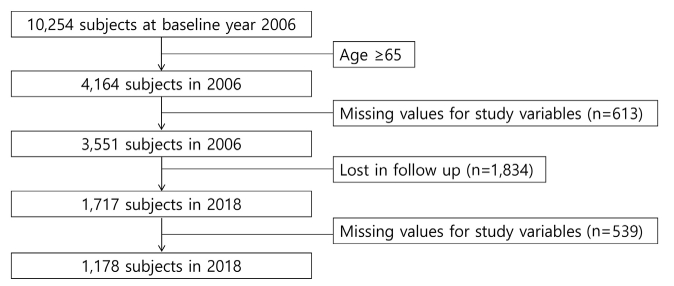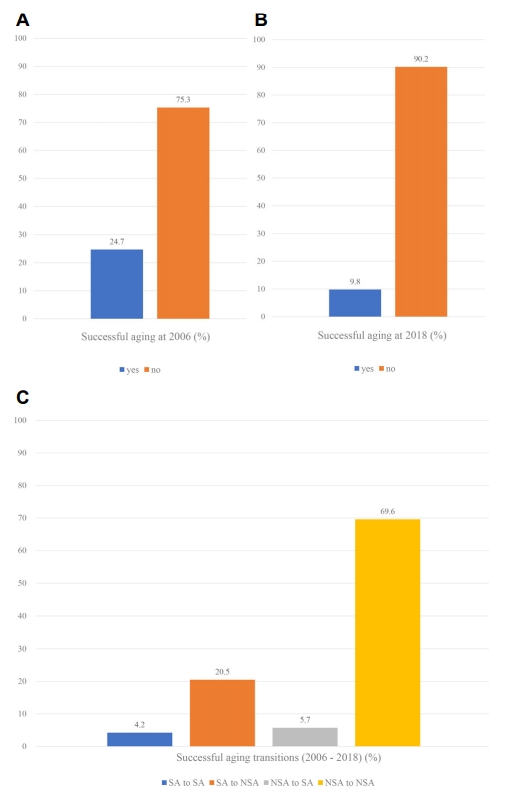Korean J Health Promot.
2022 Jun;22(2):103-112. 10.15384/kjhp.2022.22.2.103.
Successful Aging Transition and Its Impact on Self-Rated Health and Life Satisfaction: Findings from the Korean Longitudinal Study of Aging (2006-2018)
- Affiliations
-
- 1Department of Family Medicine, Sanbon Hospital, Wonkwang University School of Medicine, Gunpo, Korea
- 2Department of Family Medicine, Ilsan Paik Hospital, College of Medicine, Inje University, Goyang, Korea
- KMID: 2531098
- DOI: http://doi.org/10.15384/kjhp.2022.22.2.103
Abstract
- Background
The concept of successful aging (SA) is becoming more emphasized. Since this status can change over time, it is necessary to evaluate the pattern of change and its effect on subjective well-being.
Methods
In this study, the participants aged 65 or older in the Korean longitudinal study of aging (KLoSA) were divided into four groups based on the change in SA (2006-2018), and its relationships with self-rated health and life satisfaction were evaluated.
Results
Compared to the non-SA (NSA)→NSA group, the odds ratio for positive self-rated health was 4.30 (95% confidence interval [CI], 1.64-11.31) in the SA→SA group, 3.92 (95% CI, 1.94-7.95) in the NSA→SA group, and 1.79 (95% CI, 1.28-2.50) in the SA→NSA group. High life satisfaction was 2.42 (95% CI, 1.19-4.94) in the SA→SA group and 2.50 (95% CI, 1.36-4.59) in the NSA→SA group.
Conclusions
Maintenance or improvements of a SA state has a significant association with positive self-rated health and high life satisfaction.
Keyword
Figure
Reference
-
1. Won CW, Lee S, Kim J, Chon D, Kim S, Kim CO, et al. Korean frailty and aging cohort study (KFACS): cohort profile. BMJ Open. 2020; 10(4):e035573.
Article2. Havighurst RJ. Successful aging. In: Processes of aging: Social and psychological perspectives. New York: Atherton Press;1963. p. 299–320.3. Rowe JW, Kahn RL. Successful aging. Gerontologist. 1997; 37(4):433–40.
Article4. Lu W, Pikhart H, Sacker A. Domains and measurements of healthy aging in epidemiological studies: a review. Gerontologist. 2019; 59(4):e294–310.
Article5. Domènech-Abella J, Perales J, Lara E, Moneta MV, Izquierdo A, Rico-Uribe LA, et al. Sociodemographic factors associated with changes in successful aging in Spain: a follow-up study. J Aging Health. 2018; 30(8):1244–62.
Article6. Nari F, Jang BN, Kim S, Jeong W, Jang SI, Park EC. Association between successful aging transitions and depressive symptoms among older Korean adults: findings from the Korean longitudinal study of aging (2006-2018). BMC geriatrics. 2021; 21(1):1–11.
Article7. Kim HJ, Min JY, Min KB. Successful aging and mortality risk: the Korean longitudinal study of aging (2006-2014). J Am Med Dir Assoc. 2019; 20(8):1013–20.
Article8. Szybalska A, Broczek K, Puzianowska-Kuznicka M, Slusarczyk P, Chudek J, Skalska A, et al. Self-rated health and its association with all-cause mortality of older adults in Poland: the PolSenior project. Arch Gerontol Geriatr. 2018; 79:13–20.
Article9. Krause N. Lifetime trauma, emotional support, and life satisfaction among older adults. Gerontologist. 2004; 44(5):615–23.
Article10. Whitley E, Popham F, Benzeval M. Comparison of the Rowe-Kahn model of successful aging with self-rated health and life satisfaction: the west of scotland twenty-07 prospective cohort study. Gerontologist. 2016; 56(6):1082–92.
Article11. Shin HY, Lee JY, Kim JE, Lee SM, Youn HJ, Kim JH, et al. Cause-of-death statistics in 2016 in the Republic of Korea. J Korean Am Med Assoc. 2018; 61(9):573–84.
Article12. Andresen EM, Malmgren JA, Carter WB, Patrick DL. Screening for depression in well older adults: evaluation of a short form of the CES-D (center for epidemiologic studies depression scale). Am J Prev Med. 1994; 10(2):77–84.
Article13. Irwin M, Artin KH, Oxman MN. Screening for depression in the older adult: criterion validity of the 10-item center for epidemiological studies depression scale (CES-D). Arch Intern Med. 1999; 159(15):1701–4.14. Chen LK, Woo J, Assantachai P, Auyeung TW, Chou MY, Iijima K, et al. Asian Working Group for Sarcopenia: 2019 consensus update on sarcopenia diagnosis and treatment. J Am Med Dir Assoc. 2020; 21(3):300–7. e2.
Article15. Seo MH, Lee WY, Kim SS, Kang JH, Kang JH, Kim KK, et al. 2018 Korean society for the study of obesity guideline for the management of obesity in Korea. J Obes Metab Syndr. 2019; 28(1):40–5.
Article16. Nakagawa T, Cho J, Yeung DY. Successful aging in East Asia: comparison among China, Korea, and Japan. J Gerontol B Psychol Sci Soc Sci. 2021; 76(Suppl 1):S17–26.
Article17. Feng Q, Son J, Zeng Y. Prevalence and correlates of successful ageing: a comparative study between China and South Korea. Eur J Ageing. 2014; 12(2):83–94.
Article18. Manning LK, Carr DC, Kail BL. Do higher levels of resilience buffer the deleterious impact of chronic illness on disability in later life? Gerontologist. 2016; 56(3):514–24.
Article19. Gu D, Feng Q, Sautter J. Social network types, intimacy and healthy. Social sciences in health care and medicine. Hauppauge: Nova Science Publishers, Inc.;2008. p. 11.20. Kim HJ, Min KB, Min JY. Healthy aging predicts mortality risks: results from the Korean longitudinal study of aging (2006-2014). Arch Gerontol Geriatr. 2021; 94:104333.
Article21. Au N, Johnston DW. Self-assessed health: what does it mean and what does it hide? Soc Sci Med. 2014; 121:21–8.
Article22. Pinto JM, Fontaine AM, Neri AL. The influence of physical and mental health on life satisfaction is mediated by self-rated health: a study with Brazilian elderly. Arch Gerontol Geriatr. 2016; 65:104–10.
Article23. Blazer DG. Depression in late life: review and commentary. J Gerontol A Biol Sci Med Sci. 2003; 58(3):249–65.
Article24. Jeste DV, Depp CA, Vahia IV. Successful cognitive and emotional aging. World Psychiatry. 2010; 9(2):78–84.
Article25. Depp CA, Jeste DV. Definitions and predictors of successful aging: a comprehensive review of larger quantitative studies. Am J Geriatr Psychiatry. 2006; 14(1):6–20.
Article26. Hoeymans N, Feskens EJ, Kromhout D, van den Bos GA. Ageing and the relationship between functional status and self-rated health in elderly men. Soc Sci Med. 1997; 45(10):1527–36.
Article27. Mackenbach JP, Simon JG, Looman CW, Joung IM. Self-assessed health and mortality: could psychosocial factors explain the association? Int J Epidemiol. 2002; 31(6):1162–8.
Article28. Stern Y. Cognitive reserve. Neuropsychologia. 2009; 47(10):2015–28.
Article29. Hussenoeder FS, Conrad I, Roehr S, Fuchs A, Pentzek M, Bickel H, et al. Mild cognitive impairment and quality of life in the oldest old: a closer look. Qual Life Res. 2020; 29(6):1675–83.
Article30. Stewart JM, Auais M, Belanger E, Phillips SP. Comparison of self-rated and objective successful ageing in an international cohort. Ageing Soc. 2019; 39(7):1317–34.
Article
- Full Text Links
- Actions
-
Cited
- CITED
-
- Close
- Share
- Similar articles
-
- Successful Aging: Concept and Strategies
- Association Between Knowledge and Attitude About Aging and Life Satisfaction Among Older Koreans
- Influence of Offspring on Self-Rated Health among Older Adults: Evidence from the Korean Longitudinal Study of Aging (2006–2012)
- Successful Aging and the Influencing Factors in the Korean Elderly: Focused on Family Support
- Self-rated health as a predictor of mortality according to cognitive impairment: findings from the Korean Longitudinal Study of Aging (2006-2016)




